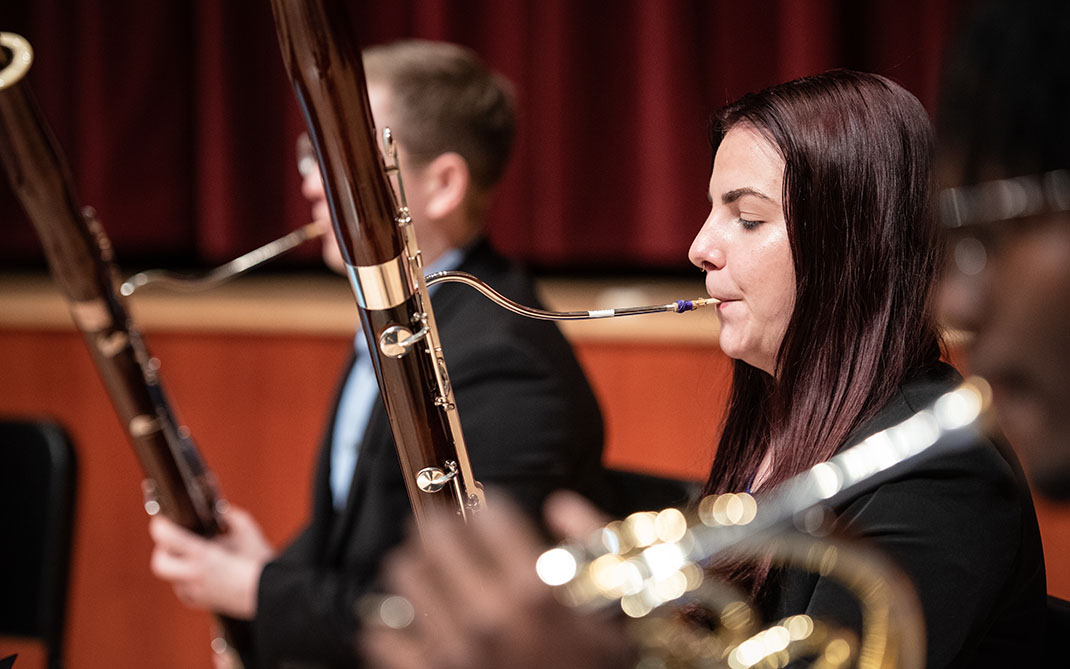Kenan grant helps bring hip-hop legend Colin Wolfe to UNCSA
School of Flimmaking faculty member Wade Wilson considers it part of his job to help the next generation of artists at UNCSA realize their dreams. So does the staff of the Thomas S. Kenan Institute for the Arts.
As part of this vision, the Kenan Institute recently awarded Wilson a Faculty Leadership Grant to bring music industry legend Colin Wolfe to UNCSA as a guest artist in residence May 1-5. Wilson invited students across all disciplines to participate in master classes with the renowned music producer, composer and bassist on topics such as music production and technology.
The Kenan Institute grant covered travel expenses for Wolfe, who lives and works in LA. In turn, the musician volunteered his time with students and at a free community performance at the Stevens Center that was live-streamed across the world by UNC-TV.
It's the community that got me to where I am today, so why not give back to the community? If I didn't have the support from them in the first place, I wouldn't be here.
Colin Wolfe
“It’s the community that got me to where I am today, so why not give back to the community?” Wolfe said during an interview on the UNCSA campus. “If I didn’t have the support from them in the first place, I wouldn’t be here.”
No doubt it helped that Wilson had an inside connection to Wolfe. The two men go way back — all the way to Paul Revere Middle School in Pacific Palisades, California, where music became their lifelong bond.
“We would jam together,” Wolfe recalled with a smile.
Both men grew up to become artist leaders, albeit by taking vastly different paths. Wolfe made music with the likes of Michael Jackson, Madonna, Aretha Franklin and George Clinton. He is perhaps best known for writing the music for Dr. Dre’s iconic hip-hop debut album “The Chronic.” (A man of many talents, he also played guitar, bass, keyboards and percussion on the album.)
Wilson, a drummer, traveled with a band for several years after college before deciding that life on the road didn’t suit him. He became a successful sound designer, starting out in television as sound effects editor for “The Simpsons” and then moving on to work in films ranging from “Elf” and “Shrek” to “The Perfect Storm” and the original “Hunger Games.” Along the way, he won six Golden Reel Awards from Motion Picture Sound Editors.
Wilson left LA in 2008, in part for the job at UNCSA and in part because he felt Winston-Salem would be a great place to raise a family.
“It has evolved into one of the most wonderful experiences of my life,” said Wilson, now the film school’s Assistant Dean and Chair of the Editing and Sound Design Department. “It is so satisfying and it feels so good to share, to open doors, to inform and to mentor these kids here.”
These days, both artists find themselves at a place in their lives where giving back feels important.
We just want to help the next generation. ... We are in the position now and have the wisdom now to maybe make a difference in these kids' lives.
Wade Wilson
“We just want to help the next generation.” Wilson explained. “Because we’ve both been so fortunate and the universe has shined upon us with these wonderful careers, we are in the position now and have the wisdom now to maybe make a difference in these kids’ lives.”
Wilson said he applied for one of the Kenan Institute’s Faculty Leadership Grants because he wanted to expose students on campus, especially those studying music, to windows of opportunity they may not have considered yet, such as composing for television or video games.
“To be exposed to new technology in music production, to how Colin builds a track and designs a song, is invaluable,” he said. “Colin has had a wide range of success with a lot of different artists, and I want these kids to have the tools in their toolbox to design their own careers. The more you have in your toolbox when you hit the outside world, the better the opportunities will be for you.”
Wilson’s sentiments were echoed by UNCSA School of Music Dean Brian Cole: “The world of music is so very big, and the only limits are those that we impose on it. The future of the music industry requires us all to consider many new forms of music-making in the digital age.”
The music industry has changed dramatically since Wolfe got his start in the late 1980s.
“It used to be about finding that one new artist, that one raw talent,” Wolfe said. “With the big labels, you were discovered — they found you singing in the church or singing on the corner — and they took the time to actually develop you. Nowadays, the industry is just like a big, money-making machine. They don’t care about the next new artist. They just care about making money off the next new artist.”
Young artists today must develop themselves — find their own voices, grow their own fan bases via the Internet and create their own paths to success, he said.
Achieving success requires passion, integrity and patience.
Don't compromise your integrity and your goals. Don't try to be someone else. All you have to do is keep doing your thing and you will get discovered if your stuff is good.
Colin Wolfe
“Don’t compromise your integrity and your goals. Don’t try to be like somebody else,” he advised. “All you have to do is keep doing your thing and you will get discovered if your stuff is good. Someone will discover you and share you with 10 friends. And those 10 friends will share you with their 10 friends. That is how it works.”
In partnership with UNCSA, Wolfe also traveled to Durham May 18-21 as a headline guest artist at Moogfest, a music, art and technology festival in Durham that is a tribute to Dr. Robert Moog and the profound influence of his inventions on music.
Wolfe’s visit to North Carolina would not have been possible without the Faculty Leadership Grant from the Kenan Institute, Wilson said.
“We just don’t have the money in the regular budget to do this kind of stuff. An opportunity like the Kenan grant allows me to dream about bringing these things to the school and to the community of North Carolina,” he said. “It also creates that opportunity for us to take our name and our brand out on the road and to hopefully recruit talented students from across the state to our program.”
May 23, 2017





